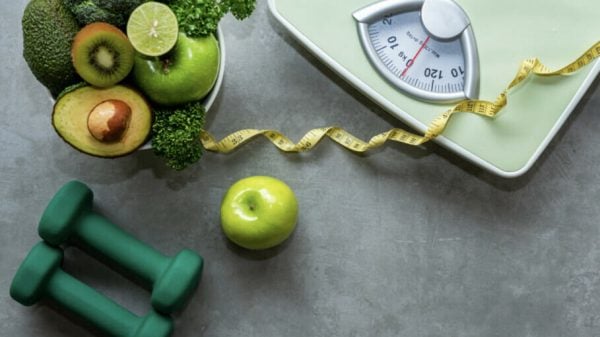The drive for “total well-being”—often confused with diet culture—is pervasive. It manifests as social media posts promoting “no cheat days,” discussions centering around feelings of guilt for indulging in dessert, elaborate skincare routines, early morning journaling rituals, and more. From advertisements to daily conversations to TikTok videos, we are constantly fed the notion that we must eat right and exercise perfectly. Put simply, there is little space for anything less than wholehearted wellness.
However, life does not always conform to such standards (nor should it). As articulated by Mikala Jamison in her “Body Type” newsletter, it is crucial to be comfortable with occasionally embracing a “halfhearted” approach to wellness. This concept is remarkably liberating and beautiful, don’t you think? Striving for “perfection” is no longer the ultimate objective; instead, it’s about being halfhearted.
Perhaps you decide to skip a Zumba class on a particular Tuesday because your child is unwell, or you are feeling under the weather, or simply because you prefer to unwind with a TV show and some takeout. These are all valid reasons—and according to experts, they are also beneficial for your health.
How Adopting a ‘Halfhearted’ Wellness Approach Benefits You
The advantages of a halfhearted approach to wellness extend across various aspects, from your mental outlook to your physical health, and even your ability to reach your objectives. Some benefits include…
Steering Clear of the Dangers Linked to “Perfectionism”
One significant advantage is the ability to combat the detrimental effects of diet culture. It encourages us to strive for good health (if desired) without setting unrealistic expectations. “It is important to acknowledge that the relentless pursuit of ‘perfect’ health can actually detract from our well-being,” states Gabriela Cohen, MS, RD, LDN, a registered dietitian at Equip Health. For instance, pushing yourself to exercise when you are unwell, fatigued, or injured can lead to prolonged exhaustion, aggravated injuries, muscle soreness, irritability, compromised sleep quality, and more. Another instance: Not consuming an adequate amount of carbohydrates can leave you feeling fatigued and shaky.
Choosing to pursue wellness in a halfhearted manner can also enhance your motivation, surprisingly. “In my experience, black-and-white thinking is one of the major obstacles in mindset,” explains Barb Puzanovova, a personal trainer certified in non-diet, HAES-aligned approaches. “Having excessively high standards may function well when everything is going smoothly, but they fall short during life’s unpredictable moments—such as illness, injury, fatigue, stress, work, or caregiving responsibilities, all of which are part of the human experience.” By adopting a halfhearted approach, you acknowledge that a 10-minute walk is better than no walk at all.
This mindset takes into consideration your overall well-being. Puzanovova provides the example of setting a goal of reaching a certain number of steps per day. If achieving this goal requires you to skip a meal or stay up late, it may not be as “healthy” as it appears.
Furthermore, Cohen suggests critically assessing what is truly healthy. While certain behaviors may seem “right” outwardly, she explains, they could actually compromise your well-being. Practices such as meditation, ensuring sufficient sleep, taking a walk, and journaling are usually safe bets, she notes, whereas eliminating food groups, avoiding rest days, and meticulously tracking calorie intake can be detrimental.
Opening Doors to Opportunities that Align Better with Your Needs
By focusing on one aspect of your health through a halfhearted approach, you create possibilities for the future. “Engaging in these ‘halfhearted’ wellness practices can not only offer immediate benefits, but these benefits can serve as the stepping stones toward achieving wholehearted wellness down the line,” explains Whitney McSparran, a licensed professional counselor at Thriveworks in Cleveland, who specializes in helping clients dealing with depression, anxiety, and self-esteem issues. If you have no other barriers hindering you—which we will discuss shortly—substituting high-intensity interval training with a leisurely walk, for instance, could result in having enough energy for your preferred cycling class the next day.
This approach also helps you stay attuned to your body’s requirements rather than conforming to the demands of diet culture (which are often misleading). “By granting yourself the permission to embrace a halfhearted wellness routine, you establish a more internally guided relationship with yourself,” according to Breese Annable, PsyD, CEDS-S, a psychologist and the founder of Living Balance Psychotherapy. “With an internally guided relationship with yourself, you allow your body and intuition to direct you on how to best care for yourself on a daily basis.” This perspective can aid in reducing external feelings of shame and judgment, she adds.
Embracing Halfhearted Wellness: What It Might Involve
Wellness, in its essence, encompasses something different for each individual in each moment. It could involve physical activity on one day and binge-watching a series on Netflix the next. It could mean dining out with friends for an evening meal on one occasion, and enjoying a home-cooked dinner with family on another, as suggested by Cohen. There is no set formula. However, these experts provide insights on how you can envision this approach working for you.
Attuning to Your Body’s Signals Daily
It is vital to recognize that your level of commitment may vary from day to day. What you consider a 50% effort in a workout routine one day might demand all your energy and focus the next.
Ultimately, it comes down to heeding your body’s signals of “yes” or “no.” When Annable contemplated performing a yoga pose like the downward dog while recuperating from COVID, her body expressed its dissent. However, when she thought about doing stretches that allowed her to lie down and gently move stiff body parts, her mind signaled approval. “Externally, it might have seemed like a very halfhearted yoga session,” she recounts. “But it was exactly what I could handle at that moment.”
Concentrating on What Holds the Greatest Significance
Considering that the weight loss industry is valued at a minimum of $72 billion, another valuable approach is to examine whether capitalist interests (as opposed to genuine wellness and the flexibility it offers) are influencing your decisions or the advice you receive from others. “Consider who might be profiting from this scenario and whether they are genuinely helping you look after your well-being,” advises Cohen.
She and Puzanovova advocate for incorporating positive elements into your life rather than solely focusing on elimination. In terms of nutrition, this could mean exploring the principles of intuitive eating, particularly the concept of “gentle nutrition” which involves adding a vegetable instead of forbidding a cookie. On the fitness front, perhaps doing stretching exercises at home aligns better with your needs than attending a hot yoga class.
“Adopting a halfhearted approach is actually an integral part of achieving our objectives, not a contradiction,” states Puzanovova. “Begin by assessing how you feel physically and emotionally.”
Does This Imply We Should Never Challenge Ourselves?
According to McSparran, the answer hinges on two factors: scale and impact. Consistently opting for a halfhearted approach might indicate that a change is needed in your life, such as a reevaluation of a too-packed schedule—especially if the consequences are serious.
For instance, missing a night of journaling is unlikely to have the same impact as neglecting to take medication for a day, she notes. “When the scope or effect of halfhearted wellness becomes too significant, it may be necessary to push ourselves,” she suggests. “Try not to view ‘halfhearted’ as a failure, but rather as an internal gauge highlighting areas of your well-being that may be overlooked.”
Initial Step: Evaluate Your Day (or Week)
An important consideration is whether this approach will serve you well in the present moment. “Discarding a practice or routine that no longer contributes positively to your life does not signify failure,” explains Cohen. This evaluation will differ from day to day. If your body signals a need for movement, engaging in some form of exercise—be it HIIT, stretching, dancing in the kitchen, or other activities—may be beneficial. However, if you are feeling fatigued and simply crave watching a comedy on television, that is perfectly acceptable as well.
If uncertain, reflect on the events of the day. “If you find yourself feeling tired, somewhat hungry, mostly fueled by coffee, and under high stress, it’s a signal to adopt a halfhearted approach,” advises Puzanovova.
“And if you find yourself in a middle ground—feeling stressed but managing to get a decent amount of sleep—try experimenting with sticking to your plans and allowing yourself the flexibility to adjust or alter your game plan as needed.”
Similarly, Cohen advises identifying the challenges you are encountering and determining direct solutions for them. If you are consistently feeling fatigued, prioritizing earlier bedtimes for several nights is likely to be more beneficial than trying to fit in a workout or limiting your carbohydrate intake. “It’s important to avoid actions driven by the wrong motivations and instead focus on more positive endeavors,” she suggests. Engaging in physical activities for enjoyment differs greatly from doing them out of disdain for your body.
Insights into your life through decision-making
If you always insist on giving your all, take a moment to ponder why. “Your values may have been shaped by cultural influences, societal norms, or even the upbringing you had in a family that prioritizes traits like hard work, productivity, success, perfectionism, and other forms of ‘overachieving,’” remarks Puzanovova. What alternative mindset feels more aligned with your true beliefs?
Conversely, if you feel compelled to approach self-care half-heartedly against your will, Puzanovova recommends exploring your needs, whether that entails adopting a more sustainable fitness routine, seeking support, and so on. Occasionally, circumstances may be beyond your control. “Is there a need to acknowledge the very real obstacles in your life—such as disabilities, financial limitations, mental health concerns, etc.—that can make mainstream wellness practices more challenging and less accessible for you?” she adds.
Moreover, it is essential to recognize these societal barriers on a broader scale. “If we view wellness as ‘one-size-fits-all’ or something that should be effortlessly attainable with minimal effort, we are setting ourselves up for feelings of shame and self-criticism, leading to potential anxiety and/or depression,” notes Ashlee Knight, LMHC, a psychotherapist and chief program officer of Project HEAL. “We also risk judging others for not pursuing wellness without understanding the unique obstacles they may face in doing so.”
Coping with feelings of guilt
Although wellness and morality are unrelated, it is common to experience guilt and shame regarding your less-than-perfect approach to self-care. These feelings are deeply ingrained in many individuals and remain prevalent in society. Despite these challenges, you can lead a content, “half-hearted” life by remembering a couple of key pointers.
Embrace the guilt *and* show yourself kindness
Avoid being too hard on yourself for feeling guilty—it is a natural reaction. “Guilt is likely to surface when you prioritize self-care less,” notes Puzanovova. “Allow yourself to experience guilt while also respecting and caring for your body.” Surrounding yourself with like-minded individuals is beneficial, as Annable suggests, recommending that you continue with your less-than-perfect self-care routine even amidst feelings of guilt, as these sentiments won’t vanish overnight.
Cohen suggests showing yourself compassion and adjusting your outlook. “Look to individuals you admire and what truly stands out to you about them,” she advises. “Chances are, it has little to do with their ‘wellness’ and more to do with their character.” She also recommends curating your social media content to include only accounts that genuinely uplift your mind and spirit.
Examine who benefits from your guilt
Reflect on the origins of your guilt and who may be capitalizing on it. “Ask yourself whether your actions have truly contradicted your values, or if the guilt stems from unrealistic expectations or rigid definitions of ‘health,’” Annable proposes.
In the end, achieving a sense of “wellness”—whatever that may mean—is far more intricate and less attainable than what corporations lead us to believe. “The fact is, genuine wellness, thriving rather than merely surviving, demands a significant amount of time, self-awareness, and privilege, and is highly unique to each individual within the framework of their own life and circumstances,” Knight adds. It’s not your fault and nothing to feel ashamed about.
Lastly, remember that well-being is not a matter of morality. “Always bear in mind that there is no obligation to change anything,” Cohen assures. “You are more than adequate just as you are.”










